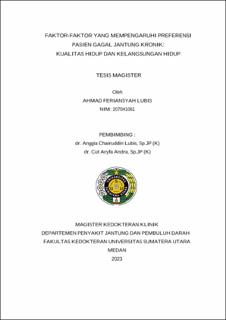| dc.description.abstract | Background: The number of heart diseases is increasing day by day, as are the occurrences of rehospitalization and mortality. In Indonesia, with its diverse population backgrounds in terms of education, culture, religion, and ethnicity, no research has been conducted to determine the actual preferences of patients with chronic heart failure. Objective: This study aims to identify the factors that influence the preferences of patients with chronic heart failure. Method: The study was conducted on patients diagnosed with chronic heart failure who were treated as outpatients. Data collection began in April 2023 until the required sample size was met. The type of this study was an observational analytic with a cross sectional design. Results: Total of 143 patients were included in this study. Majority of the patients were male (79,7%) with mean age 57 ± 10 years. 95 (66,4%) patients willing to trade their time, with 45 patients willing to trade 2 years of their lifetime to have better quality of life. From bivariate analysis, deseases factors significantly different between to groups compare to socioeconomic and medication factors. From multivariate analysis, patients with reduced ejection fraction, diabetes mellitus, and low VAS score are the independent variabel to predict the willingness of patients to choose better quality of life than longevity. Conclusion: Majority of patients with heart failure willing to trade their time to have a better quality of life. Low ejection fraction, comorbid diabetes mellitus (DM), and VAS score are the independent factors to determine the preferences of patients with heart failure. Keywords: Preferences of Chronic Heart Failure Patients, Quality of Life, Longevity | en_US |


